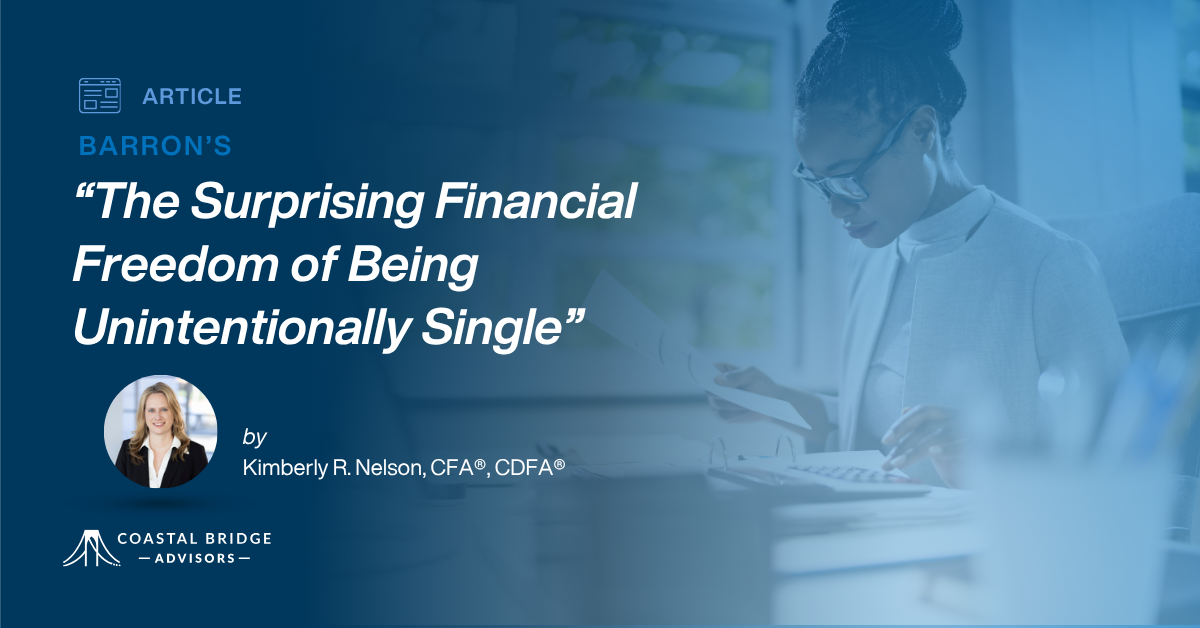Barron's: The Surprising Financial Freedom of Being Unintentionally Single
November 10, 2025
Unpartnered is not synonymous with unprepared, and it most certainly does not mean unsuccessful. It means you’re the architect of your own financial future.
By Kimberly R. Nelson, CFA®, CDFA®
I had it all mapped out. Fresh out of the University of Colorado at Boulder with a finance degree at 21, I moved to Los Angeles—the opportunity capital of the world, or so I believed. At 22, I landed my dream job.
My life plan? Flawless. I’d meet the man of my dreams at 26, get married at 29, and we’d start our picture perfect family when I was 32. A solid 10-year plan with milestones, timelines, and the confidence of a girl who had never missed a goal.
Fast-forward to today. I’m 43 years old, and officially 20 years into that 10-year plan. It hasn’t exactly gone the way I expected.
Somewhere in my late 20s, the control I thought I had over life’s timing started to slip through my fingers. I realized the universe was running on a timeline that didn’t consult my spreadsheets. Since then, I earned a postgrad credential at 29, navigated a few meaningful relationships (none of which led to marriage or children) and I am still at that dream job—and it is still deeply fulfilling.
Let’s be clear: Being single wasn’t always a choice (at least for me). Sometimes life just happens to you. Maybe the timing was off, the relationships fizzled, or the “right person” just didn’t appear. That’s what I call being unintentionally single—not by design, but by reality.
And yet, behind the emotional weight society sometimes attaches to solo living, there’s a quiet truth that deserves a little more attention: Being single can be a financial superpower.
Rewriting the narrative.
We’re told that security—emotional, social, and financial—comes from partnership. That is certainly something that was deeply ingrained into my psyche from a very young age. I grew up in a home with two very dedicated, deeply loving parents who always put their children and each other first. They modeled unwavering financial responsibility in even the worst of times and taught me lessons that continue to guide my choices.
But I found I could take another path, one that would lead to freedom, clarity, and wealth—on my own terms. For those of us flying solo, the silver lining isn’t just emotional independence. It’s financial autonomy. And it’s powerful.
One thing you learn from true financial independence is that when it’s your money, you get to make the rules. Conventional wisdom suggests that marriage is synonymous with security—emotional, social, and financial. And while that’s true for many, it isn’t the only path to stability and success.
In fact, for those who are unpartnered, one often overlooked advantage is financial autonomy. Without the complexity of shared finances, conflicting priorities, or lifestyle compromises, single individuals often experience a level of control and clarity that’s harder to achieve in partnered life.
Being unintentionally single doesn’t necessarily mean being financially behind. In many cases, it can mean being further ahead—because when you’re the sole decision maker, every dollar is an intentional one.
No debates over spending habits. No tug of war over priorities. Every financial decision is yours alone, and that clarity can be surprisingly empowering. Over time, that flexibility can open doors to greater opportunities, including higher earnings, entrepreneurial ventures, or unconventional professional paths that might otherwise be off the table.
No “Couple Costs.” Romance is lovely. But relationships can often come with big price tags: anniversary dinners and date nights, holiday gifts and joint vacations, larger homes, bigger cars, and more “toys” in the home.
While additional spending for weddings, honeymoons, and (eventually) children, are meaningful, they often result in lifestyle inflation that many single individuals can avoid. Singles can benefit from more aggressive saving, and often, more freedom to pursue nonfinancial goals. You can build the life you want—without the financial padding needed for a household of two or more. It’s your life, your money, your time, and your decisions. You don’t need to run anything by anybody.
I’ve been surprised to find that being single can open doors professionally in ways that partnerships sometimes can’t. Want to move across the country (or world) for a job? Go. Need to work odd hours or travel frequently? You can. Dreaming of a sabbatical, a side hustle, or switching careers? You have no one else’s life plans to consider but your own. This flexibility can unlock surprising opportunities—and greater earning potential over time.
It isn’t all easy. Of course, being single isn’t a financial utopia. There are very real trade-offs. There’s no second income to fall back on. You shoulder the full weight of rent, bills, and emergencies. There’s no shared health insurance or dual retirement contributions. Planning for the future requires deeper foresight—and often, a more robust emergency fund.
But here’s the thing: these challenges often build financial resilience. With no fallback plan but your own capabilities, you become a better planner, a more intentional spender, and a more disciplined saver. You learn to build security from the ground up—and that confidence, in itself, is a form of wealth.
Embracing the unplanned path. So, no, I didn’t check off the boxes I thought I would. I didn’t meet “the one,” or raise a trio of kids by 40. What started as a deviation from my plan has turned into a life I wouldn’t trade. I’ve built a stable career, accumulated wealth, and made decisions on my own terms.
I live where I want, spend with intention, invest for my future, and design a life aligned with my values. I’m not waiting on anyone else to retire, relocate, or rewrite their goals. I already did it for myself.
Being unintentionally single doesn’t mean being incomplete. It doesn’t mean financial insecurity or personal failure. It simply means the road map changed—and with it, a new version of success emerged.
Unpartnered is not synonymous with unprepared, and it most certainly does not mean unsuccessful. It means you’re the architect of your own financial future. And for many people, that can be more liberating—and more prosperous—than the life they originally planned.
Kimberly R. Nelson is a senior wealth advisor with Coastal Bridge Advisors in Los Angeles. She earned the Chartered Financial Analyst designation in 2012, and the Chartered Divorce Financial Analyst designation in 2017. She is an active member of both the CFA Institute and the Los Angeles Society of Financial Analysts. Kimberly can be reached at CNelson@CoastalBridgeAdvisors.com.
The full article from Barron's was published on 11/6/25 and can be found here: Barron's: The Surprising Financial Freedom of Being Unintentionally Single. This material by Coastal Bridge Advisors is for informational purposes only and is presented solely as an illustration of the typical advisor experience. Coastal Bridge Advisors does not provide tax or legal advice, and nothing contained in these materials should be taken as tax or legal advice. Unique client experiences and past performance do not guarantee future results.

%20(1).png?width=508&height=121&name=flourish-primary-logo@2x%20(1)%20(1).png)



